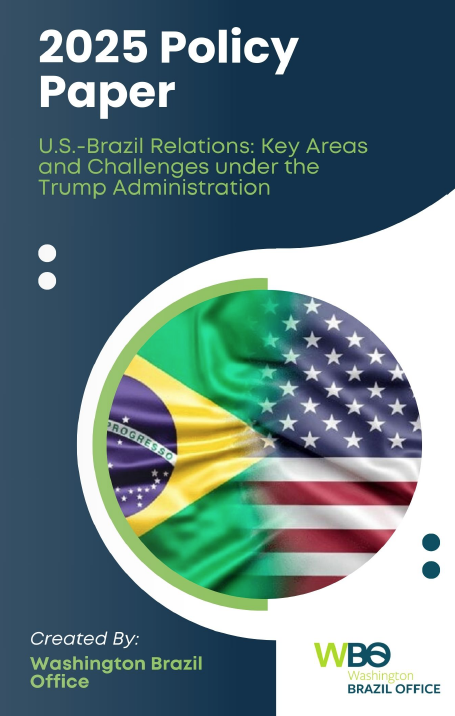
U.S.-BRAZIL RELATIONS: KEY AREAS AND CHALLENGES
This policy paper is the result of a collaborative effort driven by a dedicated group of individuals whose expertise and commitment have greatly enhanced its content. We would like to extend special thanks to the following individuals for their invaluable contributions:
• André Pagliarini: “A Brief Retrospective of U.S.-Brazil Relations in Recent Years” • Tracy Devine-Guzmán: “Environment and Sustainable Development”
• Guilherme Casarões: “Global Governance”
• Álvaro Lima: “Immigration Issues”
• Kellie Meiman Hock: “Trade and Economic Relations”
• Rafael Ioris: “Recommendations and Prospects for U.S.-Brazil Relations in a Changing World”
Your insights, research, and support have been crucial in shaping the comprehensive analysis presented in this paper.
This document stands as a collective achievement, and we are deeply grateful for the passion, expertise, and collaborative spirit of everyone involved. Without your exceptional contributions, this endeavor would not have been possible.
The 2025 Policy Paper, published by the Washington Brasil Office (WBO), serves as a critical instrument for analyzing and guiding the evolving relationship between the United States and Brazil under the new political dynamics emerging from recent leadership changes. As global governance structures shift and international alliances are tested, it becomes increasingly necessary to assess the impact of these transformations on bilateral cooperation, economic exchanges, democracy, human rights, and environmental policies. This paper provides an in-depth evaluation of key areas shaping U.S.-Brazil relations and offers actionable recommendations to strengthen diplomatic and strategic engagement between the two nations.
The primary objective of this policy paper is to present a structured analysis of the challenges and opportunities arising from the return of Donald Trump to the U.S. presidency and its implications for Brazil’s domestic and foreign policy landscape. By examining the effects of these changes on democracy, trade, immigration, environmental policies, and multilateralism, the document aims to inform policymakers, civil society organizations, academic institutions, and the broader public about the strategic considerations that should guide U.S.-Brazil relations in the coming years.
Additionally, the policy paper underscores the importance of maintaining and expanding bilateral cooperation amidst shifting geopolitical tensions. Brazil’s increasing diplomatic role in global governance forums such as the G20 and BRICS presents both opportunities and challenges for engagement with the United States. As Brazil seeks to balance its relations with the United States and other global powers, this document emphasizes the importance of pragmatic and constructive dialogue to ensure that mutual interests, particularly in democratic resilience, sustainable development, and human rights protection, remain at the forefront of bilateral discussions.
To access the Policy Paper, click this LINK:
The Washington Brazil Office (WBO) is an independent institution that specializes in analyzing Brazil and supporting actions that strengthen the role of civil society and institutions dedicated to promoting and defending democracy, human rights, freedoms, and sustainable socioeconomic and environmental development in the country.
Their objective is to produce knowledge and support the international work of all sectors that require assistance, action, bilateral exchanges, knowledge production, and the establishment of cooperative relations between Brazil, the United States, and international organizations and bodies headquartered in the United States.
Brasileiros na Itália
A imigração brasileira para a Itália tem raízes históricas. Na primeira metade do século XIX, o Brasil foi pressionado pelo Reino Unido para acabar com o tráfico de escravos criando uma crescente escarces de mão-de-obra nas zonas de expansão cafeeira. A primeira medida adotada pelos senhores do café …
Brasileiros no Canadá
Embora as relações entre Brasil e Canadá remontem a 1866 quando o Canadá inaugurou sua primeira missão comercial no território brasileiro, o primeiro registro de movimento migratório que se tem conhecimento ocorreu em 1902, quando um grupo de 48 brasileiros viajou em direção a …
Brasileiros no Japão
A emigração de brasileiros para o Japão está ligada ao fluxo migratório de japoneses para o Brasil no início do século XX. Impulsionado pelo próprio governo japonês e pela demanda de mão de obra para a cafeicultura em expansão no oeste paulista, cerca de 190.000 japoneses emigraram para o Brasil …
Remessas Sociais
As remessas são, em geral, entendidas somente como remessas monetárias. No entanto, elas podem também ter natureza social cultural. Peggy Levitt em seu artigo Social Remittances: Migration-driven Local-development Forms of Cultural Diffusion (1998) e subsequente livro The Transnational Villagers (2001), cunhou o termo “remessas sociais” (social remittances) para realçar o fato de que os imigrantes…
Remessas Monetárias
A globalização está acelerando a migração internacional. Impulsionada por uma série de fatores, tais como a crescente necessidade de mão de obra qualificada e não qualificada nos países desenvolvidos dado o baixo nível de fertilidade e o rápido envelhecimento da população; persistente pobreza…
Transnacionalismo
Imigração Transnacional Hoje, a tecnologia, economia, demografia, política, e fatores culturais têm acelerado de forma crescente a imigração transnacional. Os imigrantes transnacionais, envolvem-se em atividades além-fronteiras, e através destas constroem “campos...

